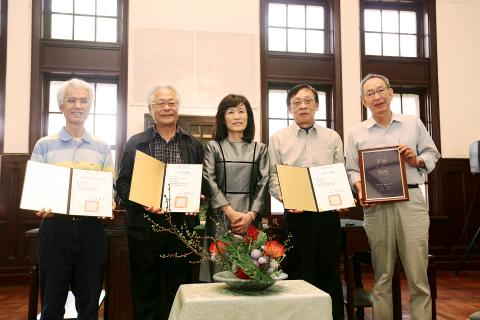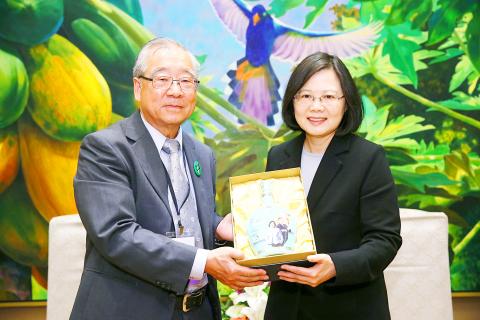President Tsai Ing-wen (蔡英文) yesterday said that the government would take the lead in investigating the 228 Incident and find those accountable for the tragic chapter in the nation’s history.
The government will investigate the Incident, present the truth and pursue those who are accountable to remedy the current status of “only victims, but no perpetrators,” the president said.
“We will not forget [the mission], nor will we circumvent it,” she said.

Photo: CNA
Tsai said she wants to let society reflect more deeply on the mistakes of the Incident, learn from it and move toward reconciliation to create a “democratic, just and united nation.”
The 228 Incident was triggered by a clash between government officials and an illegal cigarette vendor on Feb. 27, 1947. The event turned into an anti-government uprising and was violently put down by the then-Chinese Nationalist Party (KMT) regime.
An estimated 18,000 to 28,000 people were killed during the crackdown, which lasted for several weeks into early May that year, according to an investigation commissioned by the Executive Yuan in 1992.

Photo: CNA
Tsai made the remarks while receiving an overseas group consisting of family members of some of the victims, who were accompanied by Overseas Community Affairs Council Deputy Minister Tien Chiu-chin (田秋蓳), in a closed-door meeting.
“I will instruct related government agencies to continue to sort the files from the authoritarian era, so that the truth that has been kept in the dark for 70 years will come to light,” the president said.
In her address to the group, Tsai was quoted in a news release as saying that this year marks the 70th anniversary of the Incident, adding that Taiwan lost almost a whole generation of its elite due to the mistakes committed by the authoritarian rulers of the time.
“Even today, Taiwanese are still suffering from the consequences of the 228 Incident,” she said.
After Taiwan became democratic, people were finally able to openly discuss the Incident, she said.
The government has admitted mistakes, apologized, set up monuments and has probed the truth. It has also rehabilitated the names of victims and compensated their families in a bid to heal the trauma.
However, the president said she knows clearly that for the families of the victims, the government’s work is far from complete.
“We should not forget history, nor our trauma,” she said.
She said that she attended a Holocaust Remembrance Day activity in Taipei on Sunday and acutely felt the courage of Germany in facing its historical mistakes.
She pointed out that the German government, academics and the private sector have continued to probe the historical facts in a bid to more carefully dig out the truth and have continued to prosecute Nazi war criminals.
Germany’s experience is inspirational to Taiwan, she said, adding that the pursuit of historical truth and the preservation of history are long-term social goals.
The government has an obligation to continue to more thoroughly probe the truth of the Incident in an open and transparent manner so that the accountability of those responsible can be more clear and detailed, she said.
Among the files collected by the Archive Bureau, only a few have yet to be declassified, Tsai said.
She said that as far as she knows, four files belong to the Overseas Community Affairs Council, which is coordinating the process “to declassify them as soon as possible.”

AGING: As of last month, people aged 65 or older accounted for 20.06 percent of the total population and the number of couples who got married fell by 18,685 from 2024 Taiwan has surpassed South Korea as the country least willing to have children, with an annual crude birthrate of 4.62 per 1,000 people, Ministry of the Interior data showed yesterday. The nation was previously ranked the second-lowest country in terms of total fertility rate, or the average number of children a woman has in her lifetime. However, South Korea’s fertility rate began to recover from 2023, with total fertility rate rising from 0.72 and estimated to reach 0.82 to 0.85 by last year, and the crude birthrate projected at 6.7 per 1,000 people. Japan’s crude birthrate was projected to fall below six,

US President Donald Trump in an interview with the New York Times published on Thursday said that “it’s up to” Chinese President Xi Jinping (習近平) what China does on Taiwan, but that he would be “very unhappy” with a change in the “status quo.” “He [Xi] considers it to be a part of China, and that’s up to him what he’s going to be doing, but I’ve expressed to him that I would be very unhappy if he did that, and I don’t think he’ll do that. I hope he doesn’t do that,” Trump said. Trump made the comments in the context

SELF-DEFENSE: Tokyo has accelerated its spending goal and its defense minister said the nation needs to discuss whether it should develop nuclear-powered submarines China is ramping up objections to what it sees as Japan’s desire to acquire nuclear weapons, despite Tokyo’s longstanding renunciation of such arms, deepening another fissure in the two neighbors’ increasingly tense ties. In what appears to be a concerted effort, China’s foreign and defense ministries issued statements on Thursday condemning alleged remilitarism efforts by Tokyo. The remarks came as two of the country’s top think tanks jointly issued a 29-page report framing actions by “right-wing forces” in Japan as posing a “serious threat” to world peace. While that report did not define “right-wing forces,” the Chinese Ministry of Foreign Affairs was

PREPAREDNESS: Given the difficulty of importing ammunition during wartime, the Ministry of National Defense said it would prioritize ‘coproduction’ partnerships A newly formed unit of the Marine Corps tasked with land-based security operations has recently replaced its aging, domestically produced rifles with more advanced, US-made M4A1 rifles, a source said yesterday. The unnamed source familiar with the matter said the First Security Battalion of the Marine Corps’ Air Defense and Base Guard Group has replaced its older T65K2 rifles, which have been in service since the late 1980s, with the newly received M4A1s. The source did not say exactly when the upgrade took place or how many M4A1s were issued to the battalion. The confirmation came after Chinese-language media reported